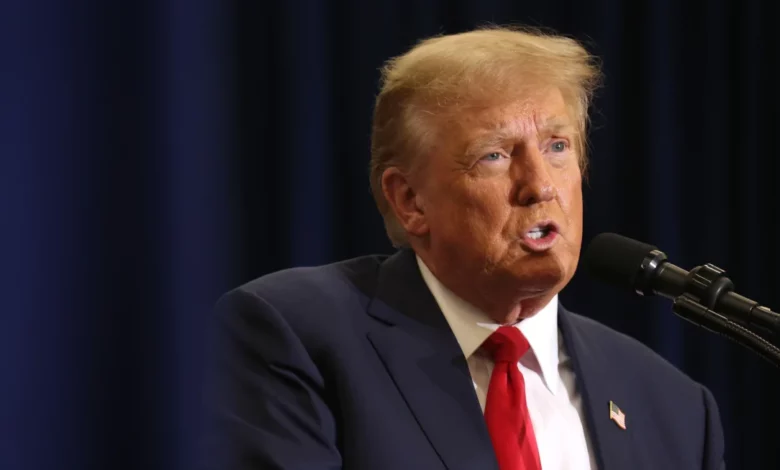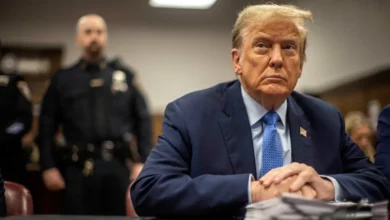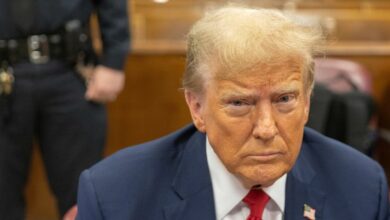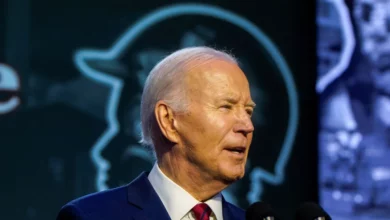
But the twin appeals Trump has now filed after being thrown off the ballot in Colorado and Maine do not fit into his normal pattern of using the law to delay and disrupt moments of personal accountability. These efforts might be self-serving and brought on by his own anti-democratic conduct in 2020. But they are also rare examples of the ex-president raising a vital constitutional issue that urgently needs to be resolved. Trump has appealed to the US Supreme Court on the Colorado matter and to a state court in Maine. Ultimately, if the high court fails to settle the issue for the whole country, the 2024 election could descend into chaos.
Trump is challenging decisions by the Colorado Supreme Court and Maine’s Democratic secretary of state to disqualify him under the 14th Amendment’s ban on “insurrectionists” in the wake of his supporters’ mob attack on Congress that followed his campaign to overturn the 2020 election.
In his petition to the Supreme Court on Wednesday on the Colorado matter, Trump argued that he did not take part in an insurrection; that his eligibility should be determined by Congress, not the courts; and that the insurrectionist ban did not apply to the presidency in any case. In an earlier filing to the top bench, the Colorado Republican Party, which is also a party in the case, had warned of “catastrophic” national consequences if the state Supreme Court ruling was allowed to stand because it would lead to endless nationwide disputes about the eligibility of candidates and could lead to “nebulous” insurrection claims. In his filing Tuesday to the Maine court, Trump argued that Secretary of State Shenna Bellows was a “biased decision maker” who lacked legal authority to hear a challenge seeking to disqualify him from office.
Any ruling from the US Supreme Court would be the final say on whether Trump is eligible to appear on the primary ballot in Colorado, Maine, and other states where his eligibility is being challenged. One reason the court is under intense pressure to take the Colorado case is to clarify the meaning of Section 3 of the 14th Amendment, which says that no person shall hold any office under the United States who, “having previously taken an oath … to support the Constitution of the United States, shall have engaged in insurrection or rebellion against the same, or given aid or comfort to the enemies thereof.”
In a more practical sense, the onus is on the Supreme Court to weigh in because a situation where some states decide to bar a candidate based on their own interpretation of the amendment and others do not is untenable not just for the 2024 election but also for US democracy in generations to come.
Key questions rely on whether Trump’s falsehoods about 2020 election fraud, his call to his supporters to rally in Washington, DC, on January 6, 2021, and for them to “fight like Hell” to save their country before the riot amount to engagement in an insurrection. Even if they do, the question then becomes, who has the power to make the determination that someone is an insurrectionist? Are those concerned entitled to due process to decide the issue? Even among his 91 criminal charges, to which he has pleaded not guilty, Trump hasn’t been formally accused of insurrection. The 14th Amendment was applied extensively after the Civil War to disqualify ex-Confederates from public office, but its use outside that context is mostly untested — certainly as it pertains to a former president.
The Colorado Supreme Court found in its stunning decision last month that Trump did incite an insurrection and, even when the siege on the US Capitol was fully underway, continued to support it overtly and directly. In Maine, Bellows wrote that while no secretary of state had ever deprived a presidential candidate of ballot access based on the 14th Amendment, “no presidential candidate has ever before engaged in insurrection.”
This is exactly the kind of constitutional knot the US Supreme Court was set up to unpick.
“This is the US Constitution we are talking about, it is the US Supreme Court that is the final word on what it means, and they have never spoken on this before,” CNN legal analyst Jennifer Rodgers said Wednesday.
Yet another precedent established
Any ordinary presidential candidate with the mountain of legal problems looming over Trump would have been driven out of the race long before now. But true to form, the ex-president has prospered politically – at least among GOP voters in pre-primary polls – with every indictment, charge and mug shot.
But after the latest dramatic legal developments, it’s worth reflecting on the unprecedented nature of the test Trump is yet again posing to the infrastructure of American democracy and the rule of law.
And some of the arguments he is making now also come across as rather rich, since he is seeking a level of protection for the individual choices of voters that he sought to deny them when he tried to steal President Joe Biden’s 2020 victory.
“In our system of ‘government of the people, by the people, (and) for the people,’ Colorado’s ruling is not and cannot be correct,” Trump’s brief to the US Supreme Court read. “This Court should grant certiorari to consider this question of paramount importance, summarily reverse the Colorado Supreme Court’s ruling, and return the right to vote for their candidate of choice to the voters.”
In their previous filing against the Colorado Supreme Court’s ruling, lawyers for the state GOP made a similar argument, claiming that by excluding Trump from the ballot, the judges had engaged in a “usurpation of the rights of the people to choose their elected officials.” Such concerns were far from Trump’s mind when, for example, he pressured local officials in Georgia to find the votes he needed to overturn Biden’s victory in the critical swing state and as he made multiple false claims of voter fraud — several of which were rebuffed by the US Supreme Court — in a bid to remain in power against the will of voters who wanted him gone.
And Trump’s insistence in his legal filing that he had called for his supporters to peacefully protest as Congress met to certify Biden’s election victory also strains credulity. In the days and weeks leading up to the January 6 riot, Trump repeatedly encouraged his supporters with combative language. “We fight like hell. And if you don’t fight like hell, you’re not going to have a country anymore,” the ex-president told the crowd on the Ellipse on January 6, 2021. Trump’s supporters and his lawyers have, however, argued that he also called on supporters to march to the Capitol building “peacefully and patriotically” – and that that was his key message despite days and weeks of calling on his people to fight.
But former Trump White House lawyer Ty Cobb told CNN’s Erin Burnett on Wednesday that the case rested on whether the 14th Amendment’s insurrectionist ban relates to the president himself. “I think the issue is not whether Trump participated or gave any comfort to insurrectionists,” Cobb said. “But whether Article 3 of the 14th Amendment actually applies to the president. I think there, sadly, that Trump has the winning hand under the Constitution.”
Cobb pointed out that the article in question does not specifically mention the president. And he said that the oath that a president takes to preserve, protect and defend the Constitution is different from that taken by other officials to “support” it, cited in Article 3. This, he said, backed up the idea that a president is distinct from other public officers mentioned in the 14th Amendment.
The question of Trump’s ballot access is critical ahead of the next election, but its resolution could also be vital to heading off the specter of yet another disputed vote that would only carve new fractures in national unity.
“It is really essential that the Supreme Court deal with the issue head-on for the general election, and certainly before the Electoral College votes are opened on January 6, (2025),” prominent conservative election lawyer Ben Ginsberg said on CNN on Tuesday. “Because one of the few things the members of Congress can do is object to the qualifications of presidential candidates, and that is not an issue you want litigated for the first time on the congressional floor on January 6.”
Trump’s expansive claims of executive power – and what they might mean in the future
Trump’s appeals over the Colorado and Maine ballot disqualifications — which have both been stayed pending ongoing court proceedings – are not the only consequential constitutional litigation in which he’s currently embroiled. As the former president accelerates his push to the Iowa caucuses on January 15, a federal appeals court in Washington next week will hear his attempt to overturn a lower court ruling against his claims of presidential immunity. He’s arguing that his attempt to interfere in the 2020 election amounted to nothing more than a proper exercise of his powers as president to ensure a free and fair vote.
Trump and his team are making plans for him to attend the arguments, CNN reported Wednesday. As he’s done before, he’ll likely try to exploit the day for political purposes. Indeed, this case appears a much better fit for Trump’s template of using the law to delay accountability. And his arguments challenge the principle that no American is above the law, implying that presidents are ultimately unaccountable for their actions in office.
In own filings in the case, special counsel Jack Smith warned that Trump’s assertion of sweeping presidential power “threatens to license Presidents to commit crimes to remain in office.” Smith has unsuccessfully petitioned the Supreme Court to take up the issue already, but the case may well be headed in that direction after the appeals court rules, a factor that will help decide whether the trial begins on March 4 as scheduled.
In his brief, Smith also sketched an ominous picture of how a future president could use the dispensations claimed by Trump. He argued against granting “immunity from criminal prosecution to a President who accepts a bribe in exchange for directing a lucrative government contract to the payer; a President who instructs the FBI Director to plant incriminating evidence on a political enemy; a President who orders the National Guard to murder his most prominent critics; or a President who sells nuclear secrets to a foreign adversary, because in each of these scenarios, the President could assert that he was simply executing the laws; or communicating with the Department of Justice; or discharging his powers as Commander-in-Chief; or engaging in foreign diplomacy.”
This is not an academic question in an election unfolding with the once and possibly future president vowing to use a second term to punish his enemies and adopting an increasingly extreme and autocratic platform.
Smith’s hypothetical legal argument just might be a glimpse of the future.




